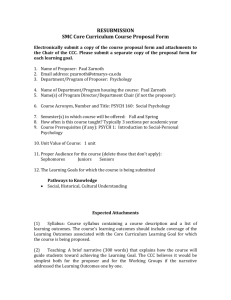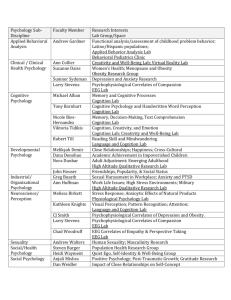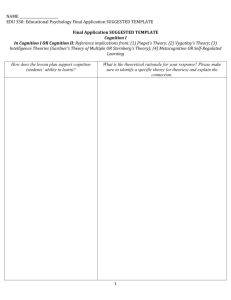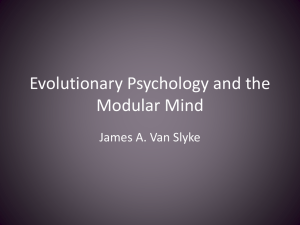University of Kent
advertisement
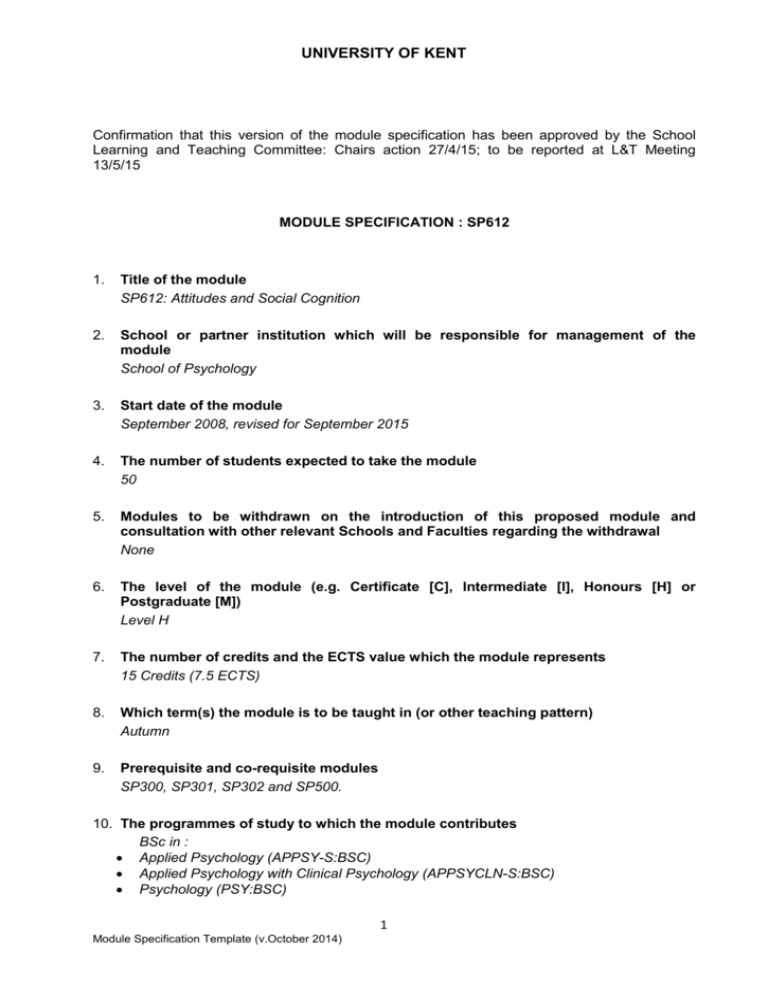
UNIVERSITY OF KENT Confirmation that this version of the module specification has been approved by the School Learning and Teaching Committee: Chairs action 27/4/15; to be reported at L&T Meeting 13/5/15 MODULE SPECIFICATION : SP612 1. Title of the module SP612: Attitudes and Social Cognition 2. School or partner institution which will be responsible for management of the module School of Psychology 3. Start date of the module September 2008, revised for September 2015 4. The number of students expected to take the module 50 5. Modules to be withdrawn on the introduction of this proposed module and consultation with other relevant Schools and Faculties regarding the withdrawal None 6. The level of the module (e.g. Certificate [C], Intermediate [I], Honours [H] or Postgraduate [M]) Level H 7. The number of credits and the ECTS value which the module represents 15 Credits (7.5 ECTS) 8. Which term(s) the module is to be taught in (or other teaching pattern) Autumn 9. Prerequisite and co-requisite modules SP300, SP301, SP302 and SP500. 10. The programmes of study to which the module contributes BSc in : Applied Psychology (APPSY-S:BSC) Applied Psychology with Clinical Psychology (APPSYCLN-S:BSC) Psychology (PSY:BSC) 1 Module Specification Template (v.October 2014) UNIVERSITY OF KENT Psychology with Clinical Psychology (PSYCLN:BSC) Psychology (with Studies in Europe) (PSY-A:BSC) Social Psychology (SOCPSY:BSC) Psychology and Social Anthropology (PSY-ANT:BSC) Psychology and Sociology (PSY-SOC:BSC) Psychology and Law (PSY-LAW-4:BSC) Not available as a wild module. 11. The intended subject specific learning outcomes On successfully completing the module, students will be able to: 11.1. understand contemporary concepts, theories and findings in attitudes and social cognition. 11.2. critically evaluate concepts, theories and findings in attitudes and social cognition 11.3. conceive research to address limitations and gaps in concepts, theories and findings in attitudes and social cognition 11.4. demonstrate an awareness of how concepts, theories and findings in attitudes and social cognition may be applied with benefits for individuals, groups, and society. 11.5. appreciate the historical and conceptual issues in the study of Attitudes and Social Cognition. 12. The intended generic learning outcomes On successfully completing the module students will be able to: 12.1. present, interpret and discuss concepts, theories, and findings based on the use of the relevant literature 12.2. understand and appreciate the diversity of theoretical and empirical approaches in psychology 12.3. critically evaluate the quality of theories, methods and findings in published research 12.4. plan work and study independently 12.5. demonstrate use of information technology skills 12.6. express well-founded opinions, argue rationally, develop new perspectives and engage in critical thinking both orally and in written form 12.7. communicate effectively psychological theories, concepts, and findings 13. A synopsis of the curriculum This module is concerned with contemporary concepts, theories and findings in this broad area of social psychology and how they may be applied with benefits for individuals, groups and society. We will address the question how individuals form and maintain an understanding of themselves, other people, and the world they are living in. Drawing on cognitive principles, we will study the processes that underlie human judgments, behaviour, and decision making in real-life contexts. Students will have the opportunity to develop new research to address an unanswered research question. 2 Module Specification Template (v.October 2014) UNIVERSITY OF KENT 14. Indicative Reading List Selected empirical articles from leading journals in the field are a primary source of reading Kunda, Z. (1999). Social cognition: Making sense of people. London: MIT Press. H. Bless, K. Fiedler & F. Strack (Eds.) (2003), Social cognition: How individuals construct social reality. Hove: Psychology Press. Maio, G. R. & Haddock, G. G. (2010). The Psychology of Attitudes and Attitude Change. London, UK: Sage. 15. Learning and Teaching Methods, including the nature and number of contact hours and the total study hours which will be expected of students, and how these relate to achievement of the intended module learning outcomes Hours Total Comments 22 Each lecture will provide students with an in-depth examination of the main concepts, issues, and research methods relating to various sub-disciplines of attitudes and social cognition (11.1-11.5, 12.2). Students will receive materials outlining the core issues and controversies in the field, drawing mainly on primary sources (research articles) (11.1-11.2, 12.2). Student learning will be guided by lecturer expertise and the core readings associated with each lecture. The module lecturers will recommend module texts, journal articles, and on-line resources for further study (12.3-12.5). A mixed lecture/seminar format and exercises will encourage students to engage with relevant materials (e.g., articles, research papers) during and outside lectures, with the aim to develop an in-depth understanding of the core debates and practices within the domain of attitudes and social cognition. Guided independent learning 128 By encouraging structured independent learning, the module will promote students’ ability to develop ideas and enable them to engage in a critical evaluation of core concepts and research methods (11.4 & 11.5, 12.1, 12.6-12.7). TOTAL : 150 Provision 11 Lectures (2 hr) 3 Module Specification Template (v.October 2014) UNIVERSITY OF KENT 16. Assessment methods and how these relate to testing achievement of the intended module learning outcomes This module will be assessed by Examination (60%) and Coursework (40%). 2hr examination 60%; To assess Learning Outcomes : 11.1-11.2, 11.4-11.5, 12.1-12.2, 12.6-12.7 Research proposal in poster-format 40%; To assess Learning Outcomes : 11.111.5, 12.1-12.7. The proposal requires students to develop a novel piece of research on an issue of their choice in the field of attitudes and social cognition. Students will review the literature critically to develop a theoretical background for a new research question, which builds on flaws, limitations or gaps in the literature. The students will articulate how their research will address those flaws, limitations or gaps, formulate a research hypothesis, and outline a research methodology and expected results. The assignment also requires the students to discuss the wider implications and potential impact of their proposed research. The poster format encourages the expression of ideas in a clear, concise, and structured manner. The poster will require use of IT software (e.g., Microsoft Word, Publisher, etc.) to prepare and present the research proposal in a clear and concise format. 17. Implications for learning resources, including staff, library, IT and space None. 18. The School recognises and has embedded the expectations of current disability equality legislation, and supports students with a declared disability or special educational need in its teaching. Within this module we will make reasonable adjustments wherever necessary, including additional or substitute materials, teaching modes or assessment methods for students who have declared and discussed their learning support needs. Arrangements for students with declared disabilities will be made on an individual basis, in consultation with the University’s disability/dyslexia support service, and specialist support will be provided where needed. 19. Campus(es) or Centre(s) where module will be delivered: Canterbury 4 Module Specification Template (v.October 2014)


